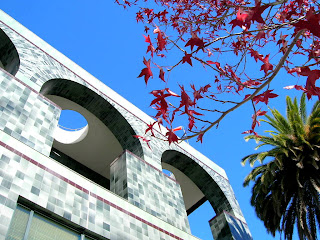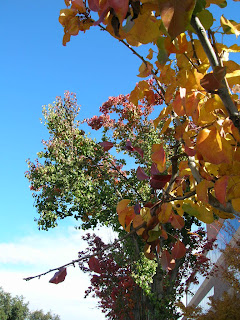 Late last week I was biking around town, enjoying the fact that I can bike my errands, one last bit of peace and serenity before I start a new job up in SF. Which ... will be quite a break in routine from the past 15 months, you could say. The sun was shining, the weather has been lovely, we've had little rain thusfar. Leaves still on the trees, far more than I'd expected for this time of year. December is barren leaves and gray days, chilly temperatures and rain on the ground.
Late last week I was biking around town, enjoying the fact that I can bike my errands, one last bit of peace and serenity before I start a new job up in SF. Which ... will be quite a break in routine from the past 15 months, you could say. The sun was shining, the weather has been lovely, we've had little rain thusfar. Leaves still on the trees, far more than I'd expected for this time of year. December is barren leaves and gray days, chilly temperatures and rain on the ground.The sun feels too bright for December, though I love it anyways. The air is too warm, and the leaves, oh, the leaves are still on the trees. Somewhere boxed up in our home that's undergoing the knife, is a picture I snapped many years ago of our neighbor's persimmon tree. In my mind's eye, it is the iconic image of winter. Stark, barren, colorless ... and then a burst of beauty, glorious orange persimmons hanging off thin spindly rickety branches, slowly weighing down the tree as they ripen until the fruit has been picked or pecked by birds, at which point the tree can slowly bend its crooked limbs and slowly straighten itself out from rheumatism and arthritis, until the next December rolls around.

Those are my memories of winter. Dad used to tie plastic bags around the persimmons to prevent the birds from snacking too much, then carefully bring them into the house to finish ripening. We love persimmons in this family, the soft and the hard kind. I think you're supposed to peel the hard kind but we never do, nobody has the time or the inclination. We love pomellos, we love pomegranates, sweet tangeringes and Comice pears and crisp Fuji apples. Those are the tastes of winter.

Mom believes in eating by the seasons, she loves the way that you can anticipate each season by the fruit that will be in season. I love all these Asian fruits, feel lucky that we can find them here in the Bay Area, sampled some in China last year.
 Beijing in dry in winter, they say you should eat more apples and pears to counteract this. So much there is related to wet/dry ... who eats spicy and who doesn't, who eats hotpot in winter and who wouldn't, who drinks soups and who has porridge for breakfast.
Beijing in dry in winter, they say you should eat more apples and pears to counteract this. So much there is related to wet/dry ... who eats spicy and who doesn't, who eats hotpot in winter and who wouldn't, who drinks soups and who has porridge for breakfast.So as I was biking and marveling at the bursts of beauty that seem to tell me that it is October and not December, admiring the great brilliance of foliage before me. I have never seen leaves so bright or so intensely colored as they are this year. Maybe its a function of the fact that they're still on the trees, still haven't fallen off yet, the pigment only intensifies.
 And as I biked, I couldn't help but notice that amongst all the brilliance, a few little patches of green still remain. Perhaps this is nature's own equilibriation machine, her way of compensating for a warm fall. If it is warm then the leaves stay on the trees longer, if they stay on longer then they can photosynthesize for longer, using up more carbon dioxide in the atmosphere to incorporate into biomass. If global warming is really happening - and signs aren't good - this little bit extra absorption of CO2 by our fair friends the plants could be a little bit of a regulation mechanism.
And as I biked, I couldn't help but notice that amongst all the brilliance, a few little patches of green still remain. Perhaps this is nature's own equilibriation machine, her way of compensating for a warm fall. If it is warm then the leaves stay on the trees longer, if they stay on longer then they can photosynthesize for longer, using up more carbon dioxide in the atmosphere to incorporate into biomass. If global warming is really happening - and signs aren't good - this little bit extra absorption of CO2 by our fair friends the plants could be a little bit of a regulation mechanism.Of course all regulation mechanisms can be overcome or overwhelmed. Like our bodies, we have internal mechanisms to tell us when we are full but those aren't foolproof, can be overwhelmed as well.

Just like when people first began predicting the effects of global warming, the emphasis was on rising tides, flooding of the coasts, etc. Lost islands, perhaps, or maybe that wasn't even included in the equation. But nature is usually more subtle than that, more complicated. All things in life tend to be more complicated. Warming changes currents, changes weather patterns, the way the winds blow. Not just floods but hurricanes, droughts, scorching summer heats that leave hundreds dead, those all must be contended with, something early models never even anticipated.

Likewise, these models probably never contended with any internal regulatory mechanisms that nature might have in place, ways to absorb the extra CO2 or SO2 or other gases. Our oceans grow more acidic, thousands of aquatic species might die, but who knows which ones will flourish? California is set to grow hotter with global warming, our home is right on the floodline if the seas should rise. With every change comes both loss and opportunity. I shudder to consider the state of things should all our ice caps melt, but life is complicated. Complicated. Always more complicated than you would anticipate.

No comments:
Post a Comment